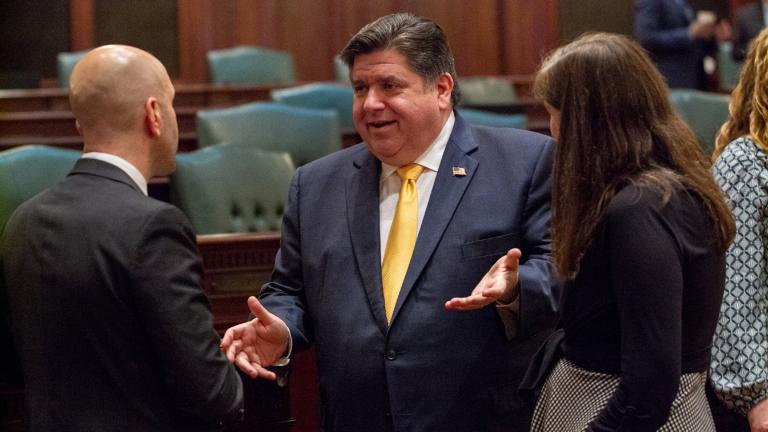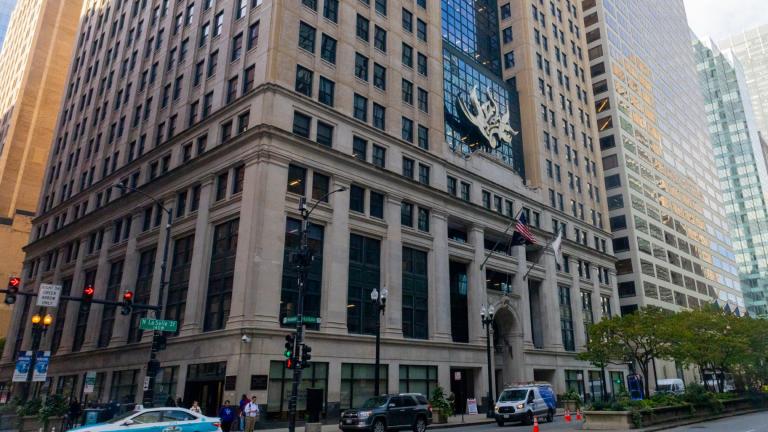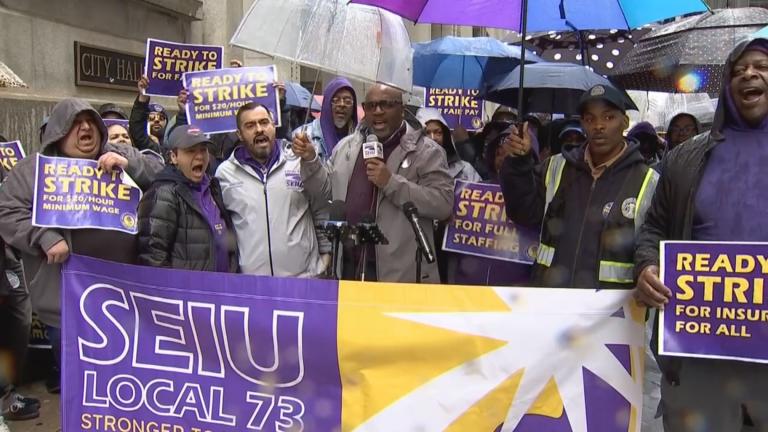 The Chicago Tribune Freedom Center printing complex is pictured in a file photo. (WTTW News)
The Chicago Tribune Freedom Center printing complex is pictured in a file photo. (WTTW News)
Tribune Publishing journalists plan to picket and rally Saturday outside Tribune Tower, their former professional home, accusing the investment firm that owns the company of brutally undercutting local news in service of a relentless thirst for profits.
Employees of the Chicago Tribune, its affiliated suburban newspapers, the Design and Production Studio that works on layouts for papers nationwide, and the now-shuttered Spanish language paper Hoy voted to unionize as part of the Chicago News Guild in 2018, with the Tribune Content Agency international syndication and newswire service voting to unionize in 2020.
But more than five years after organizing began – and more than two years after Alden Global Capital purchased Tribune Publishing in a deal much maligned by concerned reporters and readers alike – 179 members are still working without a contract.
The union says its membership in the Chicago Tribune newsroom is down by nearly half since 2019.
“One of the main reasons we wanted to unionize was to make sure that our newsroom wouldn’t be gutted – to make sure that it wouldn’t be the story,” said Chicago Tribune senior reporter Laura Rodríguez Presa, who added that the long-delayed contract is particularly frustrating during a period of high inflation. “Our salaries are staying the same. There are no raises. It almost feels like there’s no safety in our job.”
Tribune Guild members accuse Alden of slow walking contract negotiations, and making salary and benefit proposals that fail to keep up inflation and don’t reflect the financial needs of a staff that’s gone years without raises. The union says the company’s most recent proposal contains one-time bonuses but no raises, and would eliminate the longstanding 401(k) match.
An Alden spokesperson did not respond to a request for comment, but a representative contacted WTTW News after publication to request Alden be referred to as an investment firm rather than a hedge fund – a term widely used to describe the company, including by the Tribune Guild.
According to its representative, the company’s SEC filing “shows Alden has not been registered as an investment adviser since 2021. This registration is generally needed if a firm wanted to manage ‘hedge funds.’”
According to the SEC, the term hedge fund is a, “general, non-legal term used to describe private, unregistered investment pools that traditionally have been limited to sophisticated, wealthy investors.”
“When you count benefits and your salary, that really amounts to a pay cut,” said Kurt Ludke, who’s worked for the Design and Production Studio for nearly five years. “Who’s going to go for a deal like that?”
Alden Global Capital – the massive, secretive firm that purchased Tribune Publishing in 2021 – is now the second-largest newspaper chain in the U.S., with some 200 papers to its name.
Other Tribune newspapers around the U.S. are also negotiating their first contract, including the Orlando Sentinel in Florida; the Morning Call in Allentown, Pennsylvania; and the Hartford Courant in Connecticut. The company has become notorious for slashing newsroom staffs, with critics decrying its “vulture capitalism” as a detriment to democracy.
In a Poynter op-ed from September calling on antitrust regulators to investigate hedge funds and private equity firms that own newspapers, Rebuild Local News president Steven Waldman wrote: “Half of the daily newspaper circulation in America is now owned by hedge funds or private equity firms. Studies (and our own eyes) have shown that when financial firms like Alden buy local newspapers they cut local reporting staffs far more than family papers or nonprofits do.”
“Alden Global Capital is only coincidentally in the news publishing industry – they bought it because it’s cash flow they can use. It is an absolute coincidence that they are in the business of informing the public,” said Tribune Content Agency business editor Dave Mulcahey. “Who stands up for informing the public? It turns out it’s … the reporting and editing staff of these newspapers, to the extent that they survive.”
Wendy Fox Weber, entertainment editor for the Tribune’s suburban papers, first started with those papers many owners ago in 1990. She says the unionization effort gave her a sense of agency.
“I always felt like my career was something that was happening to me, and I felt like I had a voice in it for the first time ever,” she said.
Weber says the requirement that the company bargain over any changes to the status quo has helped prevent major layoffs and stave off proposed changes that would have made employee health care far more costly. But she says the drawn out contract negotiations have been frustrating, especially as they try to develop new union leaders.
“(Many people) move on because they got something better. We don’t fault them for that, we’re happy for them, but there’s been so much attrition,” she said.
Union members say they’re escalating their fight for a contract with Saturday’s rally and are planning potential future actions in an effort to turn up the heat on Alden.
The move comes amid other unionized newsrooms flexing their muscles this month, with more than 750 Washington Post staffers walking off the job, as well as reporters and photographers from 11 Southern California newspapers going on a one-day strike.
Tribune Publishing workers also hope to rally support from members of the public and highlight the important role news plays in their communities.
“We have to protect the public mission of journalism,” Mulcahey said. “We’re not asking for the stars, we’re asking for financial security to continue doing our jobs which play an important civic role.”
Rodríguez Presa added the financial security a union contract can provide is particularly important for journalists of color, noting that a Guild study found their median pay is $10,000 less than their white counterparts. That study also found women make $20,000 less than men.
“For so long, so many people of color have been pushed out of the news because of practices like this,” she said. “(This) will give us an avenue to … advocate for actual diversity and inclusion, not just putting it on paper.”
Note: This story was updated to clarify the findings of the Guild's pay study.
Contact Nick Blumberg: [email protected] | (773) 509-5434 | @ndblumberg







